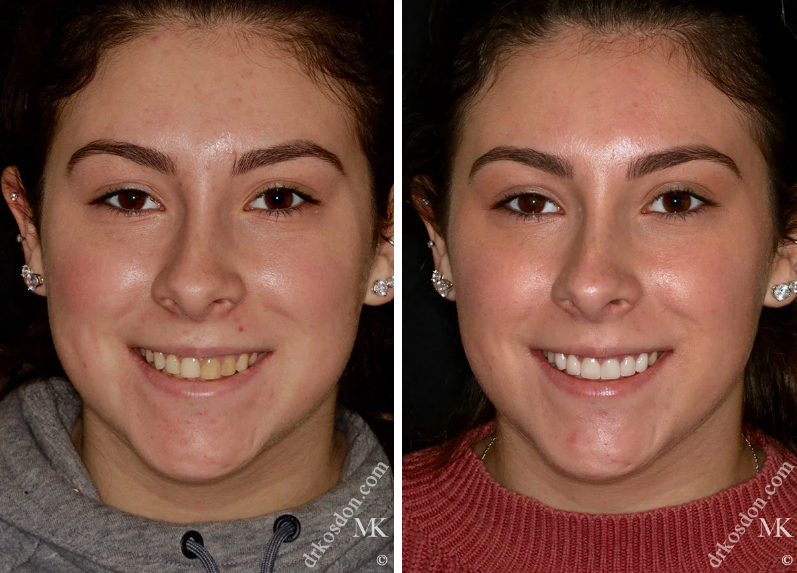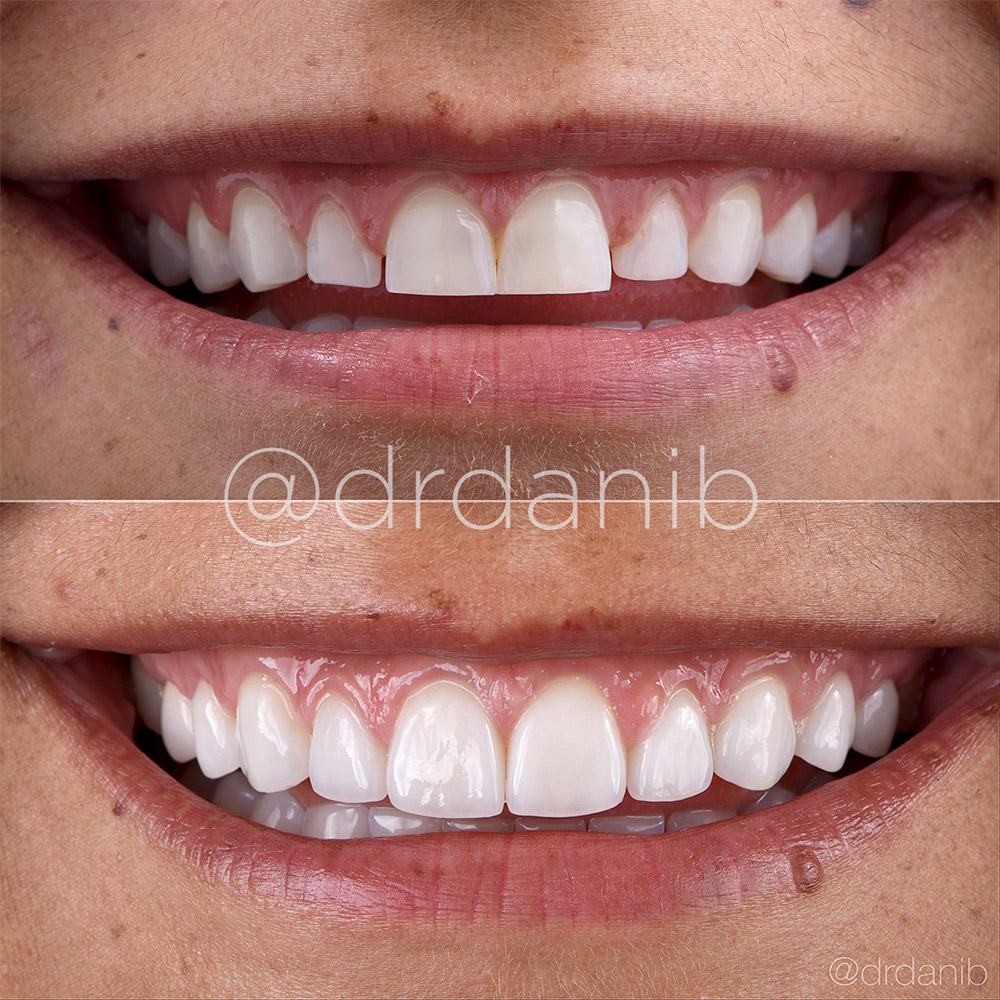Porcelain Veneers: Steps, Benefits, and Long-Term Care Tips
Wiki Article
Unlocking the Tricks of Veneers: Facts, Types, and Benefits for a Lovely Smile
Veneers offer an engaging service for those looking for to boost their smiles. These dental improvements can deal with various flaws, from discoloration to misalignment. With choices like porcelain and composite, people can pick based upon their preferences and needs. Understanding the nuances of veneers, including application and care, is essential. What elements should one think about before making a decision? The responses may amaze those thinking about this visual oral alternative.
Recognizing Veneers: What Are They?
Veneers are thin, personalized shells created to cover the front surface area of teeth, improving their look. Typically crafted from long lasting products, these shells are customized to fit each person's teeth precisely. They serve numerous purposes, including dealing with aesthetic flaws such as staining, chips, or gaps. The application process includes a dental expert preparing the teeth, often by eliminating a percentage of enamel to ensure a tight fit. Once prepared, the veneers are bound to the teeth making use of a solid adhesive.People frequently select veneers for their capability to create a natural-looking smile while offering a long-lasting remedy to dental flaws. Unlike various other aesthetic dentistry choices, veneers require marginal invasive procedures, making them a prominent selection. The outcome is a better smile that can greatly boost a person's self-confidence and self-worth. On the whole, veneers offer an effective approach to achieving a more attractive and unified oral appearance.
Kinds of Veneers: Porcelain vs. Composite
When considering cosmetic oral alternatives, 2 key kinds of veneers attract attention: porcelain and compound. Porcelain veneers are crafted from a durable ceramic product that resembles the all-natural look of teeth. They are understood for their discolor resistance and ability to show light similarly to natural enamel, providing a visual charm that numerous patients wish. The application process usually involves even more preparation of the tooth framework and may require numerous sees to the dental expert.On the other hand, composite veneers are made from a tooth-colored material that is directly related to the teeth. This kind permits quicker application and can often be finished in a solitary visit. While they are cheaper than porcelain veneers, they may not provide the exact same long life or resistance to discoloration. Eventually, the choice in between porcelain and composite veneers relies on private preferences, budget plan, and particular oral requirements.
The Benefits of Deciding On Veneers
Choosing veneers supplies various advantages that can considerably improve both the aesthetic appeals and functionality of a person's smile. Among the primary benefits is their capability to remedy blemishes such as staining, gaps, and misalignment, resulting in a much more uniform look. Veneers can additionally boost the sturdiness of teeth, giving a safety layer that shields them from damage.Moreover, they call for very little tooth preparation contrasted to various other dental treatments, maintaining more of the natural tooth framework. This preservation adds to a healthier oral setting while still attaining a stunning smile.
Veneers are highly customizable, enabling people to choose the form, size, and color that finest matches their preferences. Furthermore, they are stain-resistant, making it much easier to keep a brilliant and attractive smile gradually. On the whole, veneers present an effective alternative for those looking for both cosmetic improvement and lasting dental health and wellness advantages.
The Veneer Application Refine
The veneer application process includes several essential steps to assure suitable outcomes. Originally, a consultation is performed to assess the patient's requirements, adhered to by the preparation and shaping of the teeth. Finally, the veneers are adhered in area, with adjustments created a perfect fit and look.First Appointment Steps
An extensive initial appointment is crucial for any individual thinking about veneers, as it establishes the foundation for a successful therapy. During this conference, the dental specialist examines the person's dental health, going over any existing concerns that might influence the veneer application. This evaluation might include X-rays and an aesthetic evaluation to establish the condition of the teeth and gums.The dentist additionally engages the individual in a detailed discussion concerning their aesthetic objectives, preferences, and expectations. They might present different veneer alternatives tailored to the individual's particular demands. Additionally, the expert describes the treatment, possible dangers, and aftercare demands, ensuring that the client is well-informed and comfortable before proceeding with the treatment.
Prep Work and Forming Teeth
After the initial examination, the following stage involves the preparation and shaping of the teeth to fit the veneers. This essential step is carried out by the dentist, who very carefully analyzes the tooth framework to determine the amount of enamel that needs to be eliminated. Commonly, a thin layer, usually around 0.5 millimeters, is shaved off to ensure a correct suitable for the veneers. Accuracy is paramount during this process, as it impacts both the overall comfort and the aesthetic outcome. Once the teeth are sufficiently formed, perceptions are taken to produce custom-made veneers that line up completely with the client's dental profile. This meticulous preparation establishes the phase for an effective veneer application, boosting both look and function.Bonding and Final Adjustments
Adhering to the shaping and prep work of the teeth, the bonding procedure starts, marking an essential phase in the veneer application. Throughout this stage, an oral adhesive is related to the ready tooth surface, ensuring a strong bond in between the veneer and the tooth. The dental practitioner carefully places the veneer, making modifications to attain the desired positioning and aesthetic appeals. When properly positioned, an unique light is utilized to cure the glue, solidifying the bond. After curing, the dental practitioner carries out final changes, trimming any excess product and fine-tuning the veneer's form to ensure a natural look. This careful focus to detail boosts both function and appearances, adding to an overall attractive smile that is long-lasting and long lasting.Caring for Your Veneers: Upkeep Tips
Taking care of veneers is important to maintain their look and longevity. A regular daily cleansing routine, conscious avoidance of discoloring foods, and normal dental exams are essential components of reliable maintenance. These techniques assist assure that veneers stay in peak problem and continue to boost one's smile.Daily Cleaning Regimen
On a regular basis keeping veneers is crucial for their durability and look. A proper daily cleansing routine can aid preserve their sparkle and prevent damage. Dental professionals suggest brushing two times a day with a soft-bristled toothbrush and fluoride tooth paste, making sure that all surface areas are cleaned gently to prevent damaging the veneer surface area. Flossing everyday is likewise crucial to Dental Veneers remove food particles and plaque from between teeth, where brushes might not get to. Furthermore, using an antimicrobial mouth wash can assist maintain oral health without hurting the veneers. It is advisable to avoid rough cleaners and tools that can scrape the veneer. By adhering to these straightforward steps, people can maintain their veneers looking attractive while promoting overall dental health and wellness.Staying Clear Of Discoloration Foods
Although veneers are designed to enhance the look of teeth, their susceptibility to discoloring requires careful dietary selections. It is crucial for individuals with veneers to be mindful of certain foods and beverages that can lead to staining. Dark-colored things such as coffee, merlot, and berry juices need to be eaten in moderation, as they are known to tarnish both all-natural teeth and veneers. Furthermore, acidic foods like citrus fruits container weaken the bonding representatives made use of in veneers, making them extra susceptible to staining. To keep a brilliant smile, it is suggested to wash the mouth with water after taking in staining foods and to exercise routine oral health. These thoughtful options contribute substantially to the long life and looks of veneers.
Normal Oral Examinations

Keeping the honesty of veneers requires a commitment to regular dental check-ups, as these visits play an essential function in ensuring their durability and look. During these visits, dental specialists can assess the condition of the veneers, looking for any type of indications of wear, damage, or underlying dental problems. Furthermore, regular cleansings assist remove plaque and tartar that can gather around the veneers, promoting overall oral health. Dental experts can likewise offer individualized suggestions on treatment methods and products matched for veneer upkeep. By sticking to a routine of check-ups, individuals can resolve possible issues early, ensuring their smile remains vivid and attractive. Eventually, regular oral gos to are a critical part of veneer care.
Is Veneers the Right Option for You?
Choosing whether veneers are the right alternative often rests on private dental requirements and aesthetic goals. For those seeking to address concerns such as discoloration, chips, or imbalance, veneers can offer a transformative service. Prospects commonly include people with healthy teeth yet prefer a boosted smile.
It is important to take right into account aspects such as tooth enamel condition, the degree of oral concerns, and the readiness to preserve veneers. Consulting with an oral professional is important, as they can review dental health and identify if veneers appropriate
Furthermore, possible prospects should show on the long-lasting dedication, as veneers may require replacement every 10-15 years. Expense considerations additionally play a considerable duty, as veneers can be a substantial investment. Eventually, the choice should be well-informed, balancing aesthetic needs with useful considerations for enduring outcomes.
Often Asked Concerns
The Length Of Time Do Veneers Typically Last Before Needing Substitute?
Veneers typically last in between 10 to 15 years prior to requiring substitute. Elements such as oral hygiene, lifestyle choices, and worldly quality can affect their durability, making regular dental check-ups crucial for preserving their condition.Are Veneers Safe for People With Delicate Teeth?
Veneers can be risk-free for individuals with delicate teeth, but it typically depends upon the intensity of sensitivity and the dental expert's method. Consulting a dental specialist prior to proceeding is vital to guarantee perfect outcomes.Can Veneers Be Gotten Rid Of or Replaced Easily?

Do Veneers Stain In Time, and Exactly How Can I Avoid It?
Veneers can discolor in time, especially from foods and beverages like coffee or merlot. To stop staining, maintaining good oral hygiene, utilizing a straw for beverages, and normal oral cleanings are recommended practices.What Is the Cost Range for Getting Veneers?
The cost of veneers generally ranges from $500 to $2,500 per tooth, depending upon aspects such as product type, dental expert experience, and area. People should speak with oral experts for individualized quotes and financing options.As soon as the teeth are appropriately formed, impressions are taken to create personalized veneers that line up perfectly with the person's dental profile. Throughout this stage, an oral adhesive is applied to the prepared tooth surface area, guaranteeing a solid bond between the veneer and the tooth. It is vital to take right into account elements such as tooth enamel condition, the degree of dental concerns, and the desire to maintain veneers. Veneers can be secure for individuals with delicate teeth, however it often depends on the extent of sensitivity and the dentist's method. The cost of veneers commonly ranges from $500 to $2,500 per tooth, depending on variables such as material kind, dentist experience, and location.
Report this wiki page